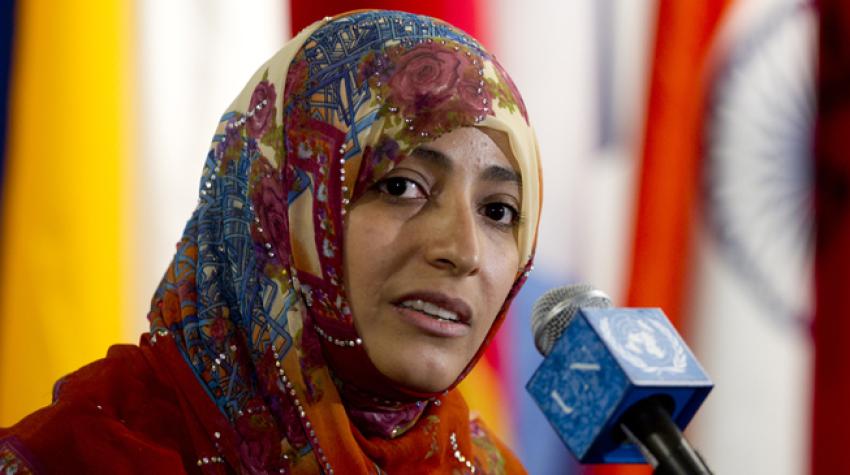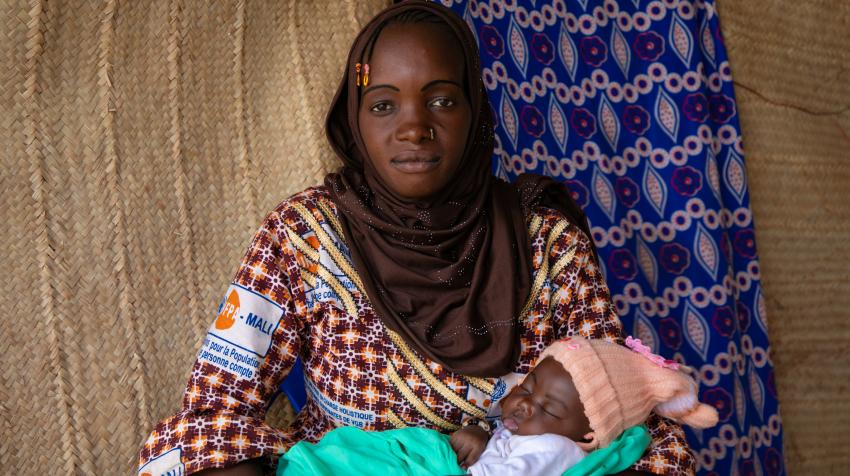December 2016, No. 4 Vol. LIII, Human Rights
No one will forget the scenes of women rallying in the streets and public squares of the Arab world, demanding the overthrow of repressive regimes that had been in power for decades. Those scenes were an important signal that Arab society was changing for the better.
The broad participation of women in the Arab Spring revolutions shocked the authoritarian regimes, which had expected that women would remain cautious and wouldn’t take part in popular demonstrations that could have posed serious risks to their lives. Women’s participation in the 2011 protests confounded dictatorships and intelligence services, as it showed the full extent of the popular rejection of such entities and contributed to the quick downfall of several oppressive regimes. It also revealed the important role that women could play in challenging the resistance to change, the lack of any meaningful political reform, and authoritarian regimes rife with nepotism, corruption and bribery. Political and cultural elites did not anticipate that women would take part in popular uprisings.
Today, some bemoan the deteriorating conditions of women as a result of counter-revolutions that have used different forms of repression, armed violence and expropriation of public spaces. They have blamed the Arab Spring, which raises eyebrows.
Arab popular uprisings were neither surplus to foreign requirements, nor did they erupt from the machinations and motives of other countries or at the whim of local parties. A comprehensive review of the overall human rights situation, as well as the political, economic and social conditions in the countries in which the uprisings took place, points to the inevitability of the revolutions. Youth, who were fed up with the autocracy, corruption and bribery, had no choice but to proceed in this way.
In 2011, women surprised everyone when they decided to change from being victims to inspiring leaders. We can now say with confidence that women and young people brought about the Arab Spring, made sacrifices and paid a heavy price for their involvement during and after the uprisings.
Why did women make this unexpected move? Perhaps because they, like the youth of these countries, were the biggest victims of those corrupt regimes that had failed to respect human dignity and provide them with liberty, essential freedoms and equal rights. They were thus the main beneficiaries of change, and they made sure that change continued every day.
Just as women were the vanguard of the revolutions, they were also the biggest victims of the counter-revolutions, which exacted revenge on them once the oppressors imagined that they had achieved a victory. Revolutionaries, however, do not forget their revolution; people’s dreams do not fade away but come true in the end.
Despite their participation at the forefront of the Arab Spring demonstrations, frustratingly, women have been ignored in political arrangements, and their presence at the top levels of government is less than it should be. The very low participation of women and youth in the transitional Governments is a result of incomplete revolutions. Subsequent events have proven, however, that it was in their interest to remain outside such Governments, as this enabled them to play the role of observers and highlight shortcomings and failures of authorities. They were able to contribute dissenting voices during the transition period and criticize government deficiencies. Women have since done their best to support democratic transitions and have participated in great numbers in all elections. Nevertheless, the political process and the advancement of women, which reached a peak during the Arab Spring, have since lost steam.
One reason why no one has taken advantage of women’s and youth’s visions and abilities is the absence of political entities that believe in the importance of their roles in decision-making and state-building. This perspective will remain until youth and women establish new political parties that can absorb their energy and ideas. Despite the lack of participation of women in state institutions, they have enjoyed greater political freedoms during the transitional period in the Arab Spring countries, and have practised various forms of expression, such as taking part in demonstrations and in the organized opposition.
Having resorted to violence, the counter-revolutionary forces gave neither the transitional Governments nor revolutionary powers any chance to bring about political development and build democratic institutions to advance their States. Only Tunisia has seemingly ridden out the repercussions of counter-revolutions thus far. Unlike in Egypt, Yemen and Libya, where all progress was lost due to coups and counter-revolutions, rights and freedoms that Tunisians have gained subsequent to the uprisings are still in place and enjoyed by everyone.
It is well-known that there was a wide margin of rights and freedoms in the Arab Spring countries, wherein various forms of liberty flourished, including freedom of speech, assembly and the press, as well as freedom of association and to demonstrate. These rights cannot be underestimated, as they mobilize communities to proceed with political development and further reforms to achieve their objectives.
History has proven that we cannot talk about women’s rights without talking about human rights. Only in democratic States that guarantee the rights and freedoms of all citizens will women be recognized as equal persons under the law. The battle that women must wage today should not be one aimed at personal gain but one that will free societies from fear, poverty and tyranny. These goals will not be achieved without radical changes that will inevitably affect dictators, laws, constitutions, institutions and policies. The first phase begins with overthrowing despots. Next, fundamental changes have to be made to existing institutions. Subsequently, policies can be changed through free and fair elections. The battle of the Arab Spring and the road map for future struggles should be understood in this way. This is what women must fight for, and they should not be victims of deception and pointless battles. The promotion and protection of human rights, freedom and democracy are the right way for women to obtain equal rights. We should not settle for minor gains such as those that existed before the Arab Spring.
Today, with the exception of Tunisia, women in the Arab Spring countries are paying the price for having stood up for change. Counter-revolutionaries have decided to punish women for their role in the uprisings, but such measures have failed to break them. In Yemen’s capital, Sana’a, which is currently controlled by the ideological Houthi militia, only women hold protest demonstrations and take part in sit-ins, a clear indication that they have decided to continue the struggle for freedom. In Syria, women are remaining steadfast in the face of both tyranny and extremism, while women in Egypt are bold enough to criticize the lack of fundamental rights and freedoms under the shadow of military rule. This shows that after the Arab Spring, women are different from what they were before.
This change is also an important element in the restoration of the revolutions. It has been difficult to continue lying on behalf of women, as had happened in the past. Women, as well as men, must come to realize that everything has changed.
The UN Chronicle is not an official record. It is privileged to host senior United Nations officials as well as distinguished contributors from outside the United Nations system whose views are not necessarily those of the United Nations. Similarly, the boundaries and names shown, and the designations used, in maps or articles do not necessarily imply endorsement or acceptance by the United Nations.




